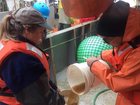A vast bloom of toxic algae off the U.S. West Coast is denser, more widespread and deeper than scientists feared even weeks ago, according to surveyors aboard a National Oceanic and Atmospheric Administration research vessel.
This coastal ribbon of microscopic algae, up to 40 miles wide and 650 feet deep (60 kilometers wide and 200 meters deep) in places, is flourishing amid unusually warm Pacific Ocean temperatures. It now stretches from at least California to Alaska and has shut down lucrative fisheries. Shellfish managers on Tuesday doubled the area off Washington's coast that is closed to Dungeness crab fishing, after finding elevated levels of marine toxins in tested crab meat.
 Full Story
Full Story
Somewhere between the rise of single-cell organisms from the primordial soup and the advent of dating apps, reproduction made the leap from cloning to sex.
A ghostly, bottom-dwelling ocean creature that came and went some 565 million years ago just may be the first to cross that threshold, according to a study published this week in Nature.
 Full Story
Full Story
French President Francois Hollande on Tuesday welcomed a U.S. plan to cut carbon emissions as a "major contribution" to an upcoming global climate conference in Paris.
His U.S. counterpart Barack Obama unveiled plans on Monday to force power plant owners to cut emissions of carbon dioxide -- the most common greenhouse gas that contributes to climate change -- for the first time ever.
 Full Story
Full Story
Up to 70 rotting crocodile heads have been found in an old freezer dumped at a remote Australian town, police said Tuesday, with the culprits facing large fines and jail time if convicted of the killings.
Several teenagers made the grisly find behind a row of shops at Humpty Doo, 40 kilometers (25 miles) outside Darwin on Sunday and contacted authorities.
 Full Story
Full Story
Glaciers worldwide have shrunk to levels not seen in 120 years of record-keeping, with melt-off accelerating in the first decade of the 21st century, according to a study released Monday.
On average, glaciers currently lose between 50 to 150 centimetres (20 to 60 inches) of thickness every year, reported the study, published in the Journal of Glaciology.
 Full Story
Full Story
U.S. President Barack Obama will Monday unveil what he called the "biggest, most important step we've ever taken" to fight climate change, a sensitive issue central to his legacy.
The White House will release the final version of America's Clean Power Plan, a set of environmental rules and regulations that will home in on the pollution from the nation's existing power plants, setting limits on power-plant carbon emissions for the first time.
 Full Story
Full Story
NASA is offering up wreckage from the Challenger and Columbia for public view after hiding it from the world for decades.
A new exhibit at Kennedy Space Center features two pieces of debris, one from each lost shuttle, as well as poignant, personal reminders of the 14 astronauts killed in flight.
 Full Story
Full Story
More than 2,500 astronomers from around the world are descending on Hawaii for a conference at a time when telescope construction is a sensitive issue in the state.
The International Astronomical Union's general assembly starts Monday. It was planned years in advance but is happening amid protests against the building of telescopes atop two mountains held sacred by Native Hawaiians.
 Full Story
Full Story
It really is the little lander that could.
The European Space Agency's probe Philae may be struggling to stay in touch, but its first finds on its new home are pretty special.
 Full Story
Full Story
The recent discovery of an Earth twin has boosted chances there is intelligent life on other planets. But while Pope Francis's telescope scans the starlit skies, the Vatican is sceptical of ever meeting Mr. Spock.
On a leafy hilltop near the papal summer home of Castel Gandolfo sits the Vatican's Observatory, one of the oldest astronomical research institutions in the world, where planetary scientists mix the study of meteorites and the Big Bang theory with theology.
 Full Story
Full Story



